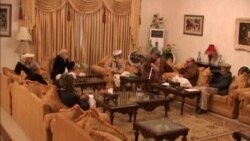The talks were to have taken place this past Tuesday but were postponed after the government sought clarification on who was on the Taliban negotiating team. Thursday's meeting, which lasted some three hours, was aimed at charting a roadmap for future peace talks to end the militants' bloody insurgency.
In a joint statement afterwards, the Taliban's chief negotiator, Maulana Sami-ul Haq, said he agreed with the government's position that both sides should avoid any steps that can disrupt the peace process.
"It is necessary for the success of the talks that all activities against peace and security should be ended," said Sami-ul Haq.
The Taliban demands include imposition of strict Islamic law, the release of its fighters from jail and the withdrawal of government troops from northwestern tribal areas of Pakistan.
Government negotiators, who previously expressed little optimism for the talks, say they left the meeting feeling encouraged.
"I am hopeful that the atmosphere which I saw today would be very fruitful and we have decided to go for a result-oriented, purposeful and meaningful dialogue. So today's meeting just encouraged me a lot and we have put certain demands [to the Taliban]. The Taliban committee has committed that they would contact the leadership of Taliban and they will take our demands to them, bring their reaction back to us, and of course their demands too. And then we will sit together and would like to elaborate all these things. And if there are certain steps to be taken by the government, of course we will go to the government," said Government Negotiator Irfan Siddiqui.
Thousands have died in the seven-year insurgency.
The Pakistani Taliban has been battling to topple Pakistan's government and establish strict Islamic rule since 2007.
Critics have accused Prime Minister Nawaz Sharif's government of taking a weak stand against the Taliban, but the prime minister says he believes both sides are now ready to find a negotiated settlement and stop fighting.
In a joint statement afterwards, the Taliban's chief negotiator, Maulana Sami-ul Haq, said he agreed with the government's position that both sides should avoid any steps that can disrupt the peace process.
"It is necessary for the success of the talks that all activities against peace and security should be ended," said Sami-ul Haq.
The Taliban demands include imposition of strict Islamic law, the release of its fighters from jail and the withdrawal of government troops from northwestern tribal areas of Pakistan.
Government negotiators, who previously expressed little optimism for the talks, say they left the meeting feeling encouraged.
"I am hopeful that the atmosphere which I saw today would be very fruitful and we have decided to go for a result-oriented, purposeful and meaningful dialogue. So today's meeting just encouraged me a lot and we have put certain demands [to the Taliban]. The Taliban committee has committed that they would contact the leadership of Taliban and they will take our demands to them, bring their reaction back to us, and of course their demands too. And then we will sit together and would like to elaborate all these things. And if there are certain steps to be taken by the government, of course we will go to the government," said Government Negotiator Irfan Siddiqui.
Thousands have died in the seven-year insurgency.
The Pakistani Taliban has been battling to topple Pakistan's government and establish strict Islamic rule since 2007.
Critics have accused Prime Minister Nawaz Sharif's government of taking a weak stand against the Taliban, but the prime minister says he believes both sides are now ready to find a negotiated settlement and stop fighting.






